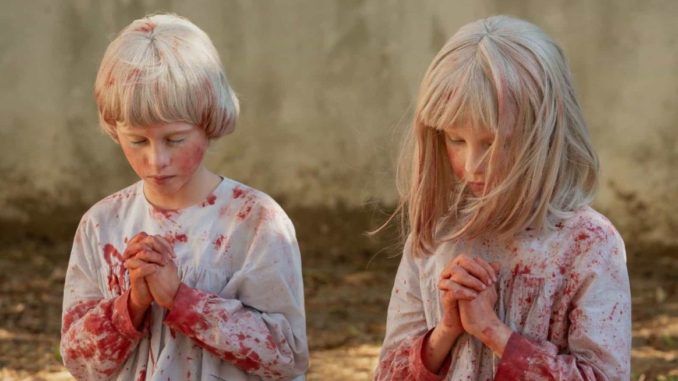
Rating: D
Dir: Rubin Stein
Star: Milena Smit, Jaime Lorente, Carlos González Morollón, Anastasia Russo
This adds a religious twist to the whole “killer child” genre, and also provides a 2-for-1 offer, including an additional lunatic minor (of equal or lesser value) free with your purchase. Unfortunately, it’s not an effective or well thought-out combination. Weird and creepy the albino siblings may be, that isn’t enough to sustain interest. It begins with Lola (Smit) suffering a miscarriage on her wedding day, which leaves her unable to have children. With her husband Adolfo (Lorente), they decide to adopt from a local nun-run orphanage, and select brother and sister Tin (Morollón) and Tina (Russo). Sure, they’re weird, extremely devout – unlike their humanist parents – and have no moral compass except a literal interpretation of the Bible. What could possibly go wrong?
The answer there is, naturally, everything. It’s nor long before the siblings are engaging in what can only be described as auto-religious asphyxiation. Lola is horrified, but rather than returning them to the convent with an emphatic, “There appears to have been some kind of mistake. I still have the receipts,” keeps them. The pet dog, which took an immediate aversion to Tin and Tina, is next in the cross-hairs, for spiritual cleaning purposes. Then, wouldn’t you know it, Lola turns out not to be as infertile as previously thought, and baby makes three. Adolfo is no help, being an airline pilot and barely there beyond the whole impregnation thing. It’s only when T&T “baptize” their baby brother that Lola eventually decides something has to be done.
 It’s all completely ridiculous, and relies on anyone responsible behaving in a way that defies both logic and common sense. It would have made more sense if the pair’s psychopathic brand of theological fruitcakery had manifested itself outside of their parents’ notice. It seems the film might be going that route when Tin and Tina go off to school. Yet this is never developed enough, until it suddenly leads to a not-so-accident involving a classmate. Oh, and as well as the unsubtle anti-religious message, it’s set in the early eighties, when Spain was becoming a democracy. So, I guess Tin and Tina are intended to be General Franco, or some similar nonsense.
It’s all completely ridiculous, and relies on anyone responsible behaving in a way that defies both logic and common sense. It would have made more sense if the pair’s psychopathic brand of theological fruitcakery had manifested itself outside of their parents’ notice. It seems the film might be going that route when Tin and Tina go off to school. Yet this is never developed enough, until it suddenly leads to a not-so-accident involving a classmate. Oh, and as well as the unsubtle anti-religious message, it’s set in the early eighties, when Spain was becoming a democracy. So, I guess Tin and Tina are intended to be General Franco, or some similar nonsense.
It definitely feels as if Stein is guilty of overloading his film with too many different elements and messages. The two-hour running time is more of a problem than a solution, and it meanders when it needs to be focused. I also found myself irrationally irritated by Lola’s hair, which resembles (I suspect quite deliberately) a knock-off Mia Farrow from Rosemary’s Baby. By the time we eventually get round to a surprisingly child-free climax, which consists mostly of Lola wandering round a burning house with absolutely no sense of urgency, I was sending up prayers to any available deities, requesting a quick ending. I am fairly certain that making viewers communicate with an unseen sky presence was not the effect for which Stein was aiming.
